
Find out what to eat to live well with MS
Professor George Jelinek pointed out the amazing statement in Neurology, the journal of the American Academy of Neurology, at the end of 2022: there is sufficient evidence to recommend a healthy diet as an adjunct intervention in MS. Overcoming MS has been promoting the importance of diet for people with MS for many years. Read on to discover what foods to eat with MS and the foods to avoid with MS.
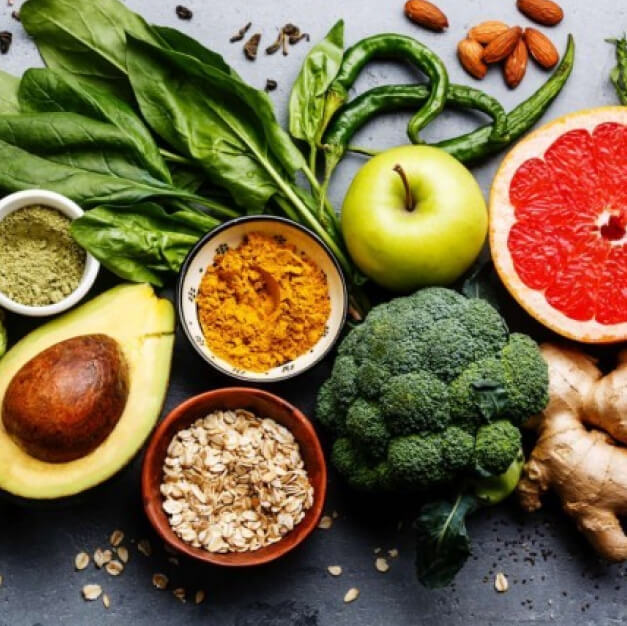
Living with multiple sclerosis (MS) means paying close attention to how everyday choices, like what you eat, can affect your well-being. To help you discover the best foods to eat with MS, we’ll explore a nutrient-rich, plant-based diet that can be part of a balanced approach to Living Well with MS.
Switching to a plant-based, wholefood diet that is rich in omega-3 while excluding dairy and minimising saturated fat intake is critical in recovering from your symptoms and living a long, healthy life.
The Overcoming MS diet provides a wide variety of foods to enjoy, including fruits, grains, fish and seafood and dairy alternatives. Check what you are encouraged to eat and what should be avoided on the Overcoming MS diet.
Following a healthy diet is important in improving symptoms and preventing the progression of multiple sclerosis.

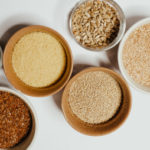
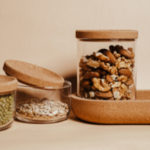



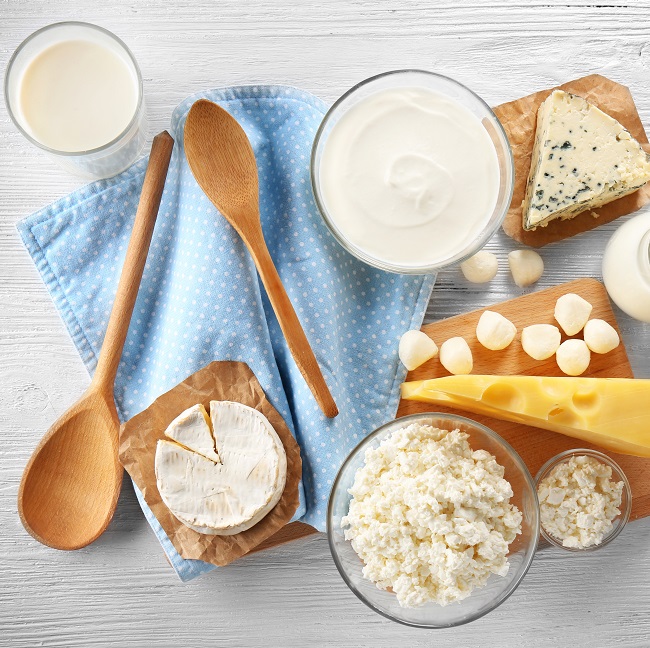
Overcoming MS recommends that people with MS avoid dairy in their diet because research shows a high correlation between MS and dairy products, because of the high saturated fat content, and specific proteins in cow’s milk.
Discover the full details behind dairy’s potential impact on your health when following a MS diet with this page.
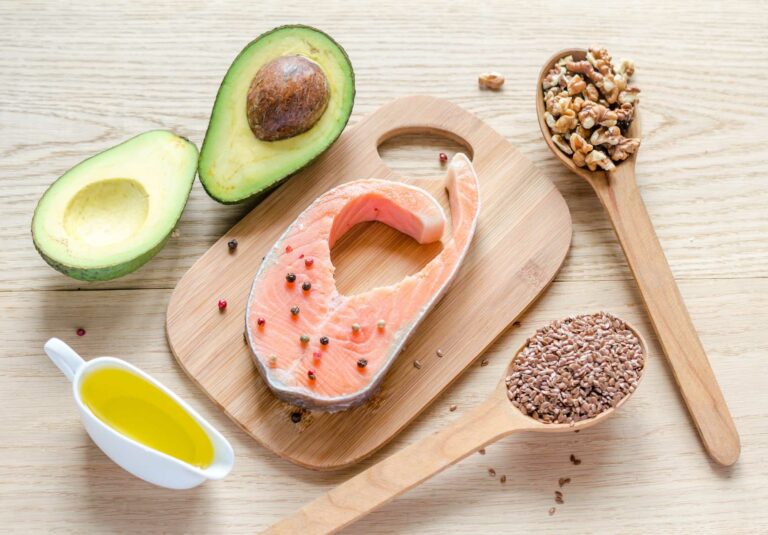
There’s a number of foods included in the Overcoming MS diet that are recommended as part of a balanced diet, but care should be taken with portion sizes and how frequently these foods are consumed.
This includes foods containing monounsaturated and polyunsaturated fats such as avocados, seeds, nuts and oily fish. These can all be consumed on the diet, but consider spreading these across the whole day or week and plan your meals ahead.
Discover the full list and reasons behind why we suggest to eat some foods in moderation.
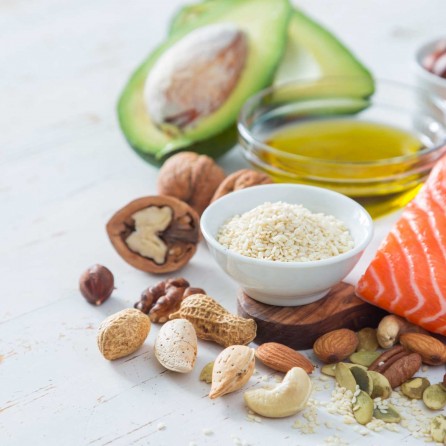
There are many types of fats we get exposed to -some are good and some are bad. We need a balance of good fats in our system to ensure we remain as healthy as possible while living with MS.
A core element of our diet suggestions is understanding the differences between those fats, their properties, and how they play a role in MS development and progression.
Discover a useful list to help you figure out which is which.

If you’re planning to follow the Overcoming MS diet – we suggest minimising the amount of ultra-processed food you eat as much as possible.
This will be an important step to staying healthy and reducing your MS symptoms. These food types can be particularly harmful for people with multiple sclerosis (MS) for several reasons, including; increased inflammation, disruption of the gut microbiome, sugar spikes and fatigue and a higher risk of obesity.
Discover the details behind why ultra-processed foods should be avoided on a MS diet.

Eating a healthy, nutrient-rich diet while managing MS can sometimes seem expensive, especially when unhealthy, ultra-processed foods are often the cheapest options. At Overcoming MS, we believe that good nutrition should be accessible to everyone, regardless of budget constraints. That’s why we’ve worked with our expert facilitators, nutritionist Karen Lee and nutritional therapist Sam Josephs to create practical, budget-friendly strategies for following the Overcoming MS diet.

If you want a quick guide to understanding the Diet pillar on the Overcoming MS Program you can download this one below. It delves into the key components, benefits and practical tips that can guide you on your way to making the lifestyle changes that will help you to Live Well with MS.
We don’t recommend calculating saturated fat. By following the Overcoming MS diet guidelines you will automatically be eating lower levels of saturated fat. In his research, Dr Swank found those eating less than 16g saturated fat a day had better outcomes than those eating 20g or more.
Both diets are plant-focused and rich in variety of fruit and vegetables, limit processed foods and include regular servings of plant proteins like beans, lentils, nuts, and seeds. Evidence shows that the Mediterranean diet is beneficial for autoimmune conditions, namely rheumatoid arthritis.
However, the Mediterranean diet still includes dairy, meat and has less emphasis on Omega-3 consumption. The Overcoming MS is a modification of this diet with specific tweaks (dairy-free, high Omega-3 intake, low saturated fat) to support more specific challenges of MS.
Absolutely! Any tinned fish is perfectly fine on the Overcoming MS Program and can be a cheaper way to get oily fish like sardines, mackerel, pilchards into the diet.
Drugs for MS do not work in the same way as some chemo drugs which aim to kill certain cells. Often with chemo, patients are advised to avoid foods like ginger or turmeric that may protect cells from the destructive action of chemo medication.
This is not the case with MS medication.
Some oral DMTs suggest eating higher fat foods before taking to reduce potential side effects. Some good whole food options include oats, wholegrains, avocado and nuts.
Grapefruit is often contraindicated with certain drugs e.g. statins due to the effect it can have on liver detoxification. But this is not the case with MS DMDs.
Not as such – but large parts of Asia eat significant amounts of soy-based products on a daily basis and suffer with lower cancer rates, less menopausal symptoms and NO adverse effects. 1 -2 servings a day is absolutely nothing to be concerned about.
Eat a variety of foods with soy and avoid the less processed versions of soy-based alternatives like tofu, tempeh or edamame beans to limit food chemicals. Organic soy and non-GMO soy are also worth looking out for.
Yes – dark chocolate contains cocoa butter which is a source of saturated fat that will drive inflammation. Being dark, the chocolate has no added milk, and the darker the chocolate the higher the cocoa butter level so 85% contains more saturated fat than the 70%. Cocoa and cacao powder however can be enjoyed on the overcoming MS diet.
You may need to eat more food; the Overcoming MS diet with its whole foods are less calorie dense than the standard Western diet. Be sure to get sufficient proteins and remember the Overcoming MS diet is a low saturated fat diet, not a low fat diet. Get plenty of the good fats in your diet – nuts, seeds, oils (dressings, flax on cooked food / soups / curries etc), and oily fish 3x a week if you are eating fish.
The abundance of calcium-rich plant foods means that in the Overcoming MS diet there is plenty of calcium provided. What’s more, the calcium in plant foods is often combined with other vitamins and minerals that aid its absorption and help to build strong bones e.g. Vitamin K, Magnesium and Boron. Foods like leafy greens, tahini, calcium-set tofu, almonds and orange juice all contain high levels of calcium.
Populations where dairy consumption is highest, also exhibit the highest cases of osteoporosis. Both exercise and Vitamin D intake on the overcoming MS program will help guard against osteoporosis too.
To date the studies into gluten as a contributor to MS are comparatively few. At the moment, there is certainly not enough evidence to suggest people with MS need to avoid gluten. In fact, it can be more detrimental than good to cut gluten out of the diet without good reason and without an allergy (coeliac disease) or an intolerance (Non-Celiac Gluten Sensitivity – NCGS).
There is no harm in heating nut butters. Nut butters (without added oil) contain high levels of the neutral monounsaturated fat which makes them more stable at higher temperatures. Vegetable oils – such as sunflower oil – have much greater concentration of polyunsaturated fats which can spoil at a lower temperature than is tolerated by monounsaturated fats. Be mindful of nut butters with added oils.
If heating nut butters as part of a recipe, avoid high temperatures e.g. more than 180°C.
Nut butters and nuts contain comparable amounts of fat, but some nut butters have added oils which would obviously affect this. Our understanding on the difference between butter/nut is that to make the butter, you roast the nut thereby exposing the potentially delicate oils to heat.
Peanuts are defined as a ground nut and not recommended due to their higher saturated fat and Omega 6 content and the fact that they are usually roasted in oil or dry roasted.
Enjoy other nuts instead – walnuts, almonds, pecans and pistachios. Walnuts have the most omega 3 content.
Brazil nuts, macadamias and cashew nuts contain more saturated fat than some other tree nuts e.g. almonds or hazelnuts so will require a smaller portion size.
There are no specific restrictions about caffeine included in the Overcoming MS Program. However you should follow standard health advice about consumption of caffeine – ‘in 2015 the European Food Safety Authority (EFSA) published their Scientific Opinion on the Safety of Caffeine, advising that caffeine intakes from all sources up to 400 mg per day and single doses of 200mg do not raise safety concerns for adults in the general population.’
There is no compelling evidence linking added sugar to worsening MS symptoms, however through following a plant-based diet most people naturally reduce the amount of sugar they consume. You can follow the standard dietary guidelines (e.g. WHO recommends a maximum of 5 to 10 teaspoons of free sugars per day) and avoid high added sugar items like sugar-sweetened beverages and ultra-processed foods.
Unrefined sugars such as raw honey, dates, molasses and maple syrup are all good options for home baking.
Often hailed as a healthy oil in the media, coconut products actually contain a high percentage of saturated fat, which are excluded on the Overcoming MS program. A key issue with saturated fats is their melting point. If the melting point of a fat is above body temperature (37 C), then it will essentially behave in body cell membranes like a solid fat, making the cell membranes rigid, inflexible and sticky, thereby encouraging degeneration and inflammation. The common fats in coconut are lauric acid (with a melting point of 44.2 C) myristic acid (53.9 C) and palmitic acid (63.2 C). These fats are solid at body temperature and are likely to significantly worsen MS. We do not recommend them in any quantity. Instead, consume monounsaturated oils such as extra virgin olive oil.
No. Cow, goat and sheep milk all appear to contain the same offending protein, butyrophilin, which causes harm to the immune system. Research has found that the proteins in a range of animal milks are similar to bovine butyrophilin (reference below).
Reference: Heid HW, Winter S, Bruder G, Keenan TW, Jarasch ED. Butyrophilin, an apical plasma membrane-associated glycoprotein characteristic of lactating mammary glands of diverse species. Biochim Biophys Acta 1983;728:228-38
This is actually not an exact science and is quite complex. Our recommendations come from a synthesis of many sources. Omega-3s are helpful in MS in two ways:
If one is eating an ultra-low saturated fat diet, as with the Overcoming MS program, it doesn’t take much omega-3 to get a structural benefit; i.e. an improvement in the pliability and resilience of cell membranes. It takes quite a bit more to get the optimal immune benefit.
That is why the standard dose (often recommended by specialists) of 3g a day of fish oil is inadequate; it doesn’t really provide the immune system benefit. In studies where they have measured the dose of omega-3s to get the optimal immune benefit, they have used standard-strength fish oil.This has 120mg DHA and 180mg EPA in each 1,000mg (1g, or 1ml) capsule (i.e., a total of 300mg DHA/EPA combined).
The studies suggest that a dose of around 20g (20 ml or 20 capsules) of standard-strength fish oil gives you the optimal immune benefit.
You can of course get refined fish oil where these constituents (the actual total omega-3s DHA and EPA) are concentrated, and so this dose needs to be adjusted accordingly. For instance a super-strength fish oil (240mg DHA and 360mg EPA / capsule), you would need to take 10 capsules.
The calculation for flaxseed oil is much more complicated, as it contains ALA, which is converted in the body to DHA and EPA, but the percentage conversion varies from person to person (see pages 288-290 in the OMS book).
To simplify matters, we recommend the same dose (20- 40mls)
One of the issues with all oil supplements is that they contain saturated fat; fish oil contains around 30% and flaxseed oil around 9%.
The figure of 20 mls (20g, 20 capsules) of standard fish or flaxseed oil we recommend is a minimum to achieve the immune benefits, but more can be taken, particularly if oil intake from other sources is very limited. The body really does need some oil, and people can get dry skin and hair and lose energy if there is too little fat in the diet. If you feel you need more oil, then increase your flaxseed oil dose, because it contains the least saturated fat.
Many people prefer to stop counting, and they just use flaxseed oil regularly on their pasta, baked potatoes, salads, etc. (after cooking of course).
It is quite delicious used in this way once you are used to it. In reality, people probably get more like 30-40mls/day using flaxseed oil in this way, and that is still in accordance with the Overcoming MS program, and may well result in more energy as well as a potent structural and anti-inflammatory effect.
Although skinless chicken is low in saturated fat and allowed on the Swank Diet, it is not recommended on the Overcoming MS Program. The idea is to move away from eating animal products (as well as altered fats and so on) and to change your way of eating. It is important to change completely or otherwise the risk is that chicken ends up being on the table at every meal or chicken is placed on a pedestal as being a special treat. While the actual risk from an occasional piece of skinless chicken breast is low, the more frequently it is eaten the higher the risk. If you are worried about getting enough protein, there is an article by the Medical Journal of Australia that is worth reading.
Yes, people with multiple sclerosis can eat any seafood. Fish, scallops, lobster, prawns, crab, calamari, mussels, oysters, clams, crayfish – they’re all OK. Appropriate cooking methods should be followed when preparing any seafood.